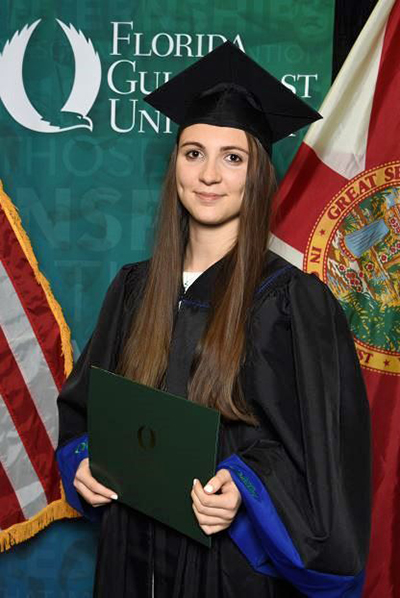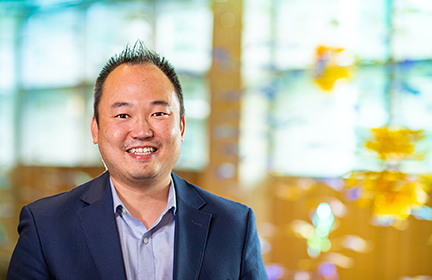Three Florida Gulf Coast University students recently wrapped up an intensive summer program sponsored by the U.S. Department of State designed to immerse participants in the study of foreign languages that have been deemed vital to the nation’s economic and security interests.
Senior biology major Katherine Patterson and spring 2021 grads Kristina Gusty and Melisa Kaplan were among the nearly 700 students representing 261 institutions of higher education from across the United States selected to take part in the summer 2021 edition of the Critical Language Scholarship Program.
The initiative provides opportunities for undergraduate and graduate students to spend up to 10 weeks studying one of 15 foreign languages and cultures – Arabic, Azerbaijani, Bangla, Chinese, Hindi, Indonesian, Japanese, Korean, Persian, Portuguese, Punjabi, Russian, Swahili, Turkish and Urdu.

Typically, scholarship recipients will travel abroad to a host institution to learn alongside top faculty scholars and to become immersed in the culture of the nation they are visiting, with the goal of accelerating fluency in their selected language. But, because of the ongoing global COVID-19 pandemic, most students involved in this summer’s program did so virtually. CLS participants from FGCU agreed they would not allow that setback to stand in the way of progress toward proficiency in their respective foreign languages.
Gusty, who currently resides in Cape Coral, Florida, studied Russian virtually at the American University of Central Asia in Kyrgyzstan, motivated by her own roots in Eastern Europe. “My family comes from the Czech Republic, and I have always felt close to Czech culture. I have also always been interested in all things Slavic. I remember trying to learn the Cyrillic alphabet every couple of months,” she said. “Unfortunately, there were no programs that I could have done throughout my schooling where I could have learned to speak Russian. This is why participating in the CLS Program for Russian was so important to me.”
Nursing graduate Kaplan, who is about to start working in the United Kingdom, selected Azerbaijani for her immersive summer program also because of family connections. “I have a great passion for Turkic culture. My father is Turkish, and I feel very connected to that culture,” she said. “I also genuinely enjoy language learning as one of my personal interests. I had done a similar program in high school called NSLIY (National Security Language Initiative for Youth, also a U.S. Department of State initiative). I went to China for six weeks on that program.” Kaplan’s online studies were hosted by Azerbaijan University of Languages.
A resident of Marco Island, Florida, Patterson chose to study Chinese through Tamkang University in New Taipei City, Taiwan, thanks to a family association of a different sort. “Originally, my mom was the reason why I wanted to learn Chinese,” said Patterson, an Honors student who also selected for the 2020 CLS Program. “When I was 12, she told me that I should learn Chinese because it will be helpful in the future. Of course, at the time I didn’t get it, since living in southwestern Florida made it seem like Spanish was the more practical option.”
There is more driving Patterson than a childhood interest in Chinese language and culture (and food, thanks to a classroom encounter with jiaozi, or pot-stickers). She intends to utilize the knowledge she gains through the CLS Program to help reach her career goal of becoming a practicing physician who combines elements of Chinese healing methods with traditional Western medicine.

“It is imperative to understand the medical practices and approaches of different cultures, especially the Chinese approach to medicine, due to our increasingly connected world. I believe that future medical professionals, including myself, need to understand the medicinal practices of cultures outside the United States,” she said. “By making collaborative efforts between both nations, I know that it is possible to combine Eastern medicine and Western technology. I want people from across the globe to benefit from a greater understanding of both fields, so that we might form a better approach to treating illnesses, minor or terminal, for each patient.”
Kaplan also anticipates putting what she has learned through her CLS experience to good use in her nursing career focusing on transcultural medical care. “I plan to work with culturally sensitive patients in the United Kingdom as well as eventually working abroad. I plan to also use what I have learned as a starting point toward reaching fluency,” she said, with the intention of hiring a private tutor to advance her education in Turkish and Azerbaijani; this is in keeping with the CLS Program expectation that participants will continue their language study beyond the summer study period. “Once I become fluent, I hope to use these skills in my nursing career. I want to eventually become certified as a medical interpreter for Turkish and Azerbaijani.”
Gusty said she also believes that her efforts to become fluent in Russian won’t end with the conclusion of her time in the CLS Program. “I will continue on my path toward being able to speak professionally in Russian,” the Honors chemistry graduate said. “I want to be able to publish my work in the laboratory in multiple languages, and I am planning on Russian being one of them.”
The participation by the trio of Eagles in the CLS Program is the latest success story made possible at least in part by FGCU’s Office of Competitive Fellowships, which guides students through the entire process of applying for prestigious national and international fellowships and scholarships. The office connects students with appropriate external opportunities, then helps them refine their application materials.
“Melisa, Kristina and Katherine gained a better understanding of themselves – or, as I like to say, the ‘why’ they want to pursue their life goals – through the application process,” said Terumi Rafferty-Osaki, director of the Office of Competitive Fellowships. “The FGCU effect – knowledge, service and culture – is very important for our region, and these three women are now representing our university as student and alumnae ambassadors on a global stage.”